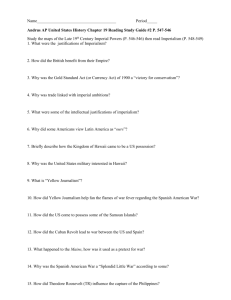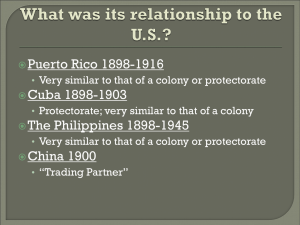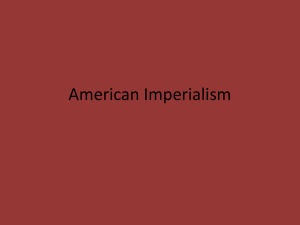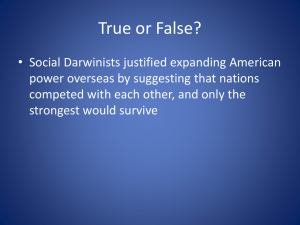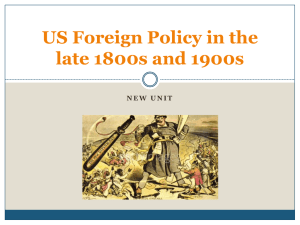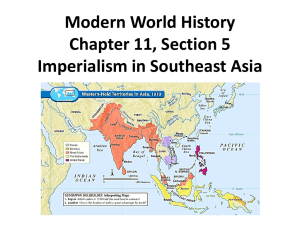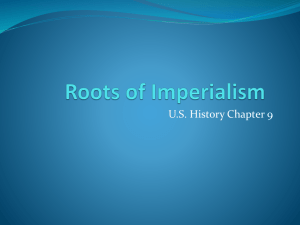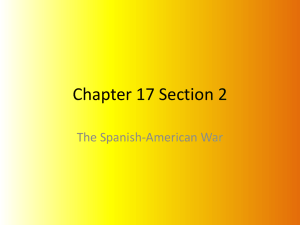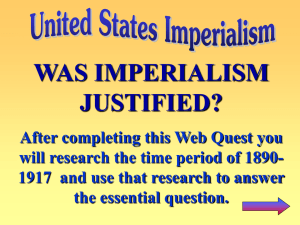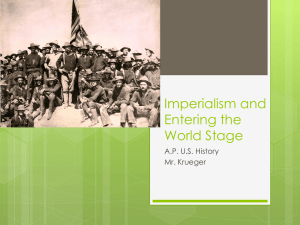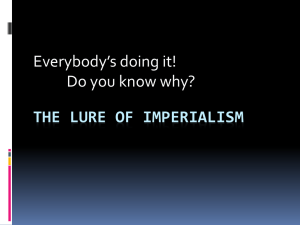PPT
advertisement
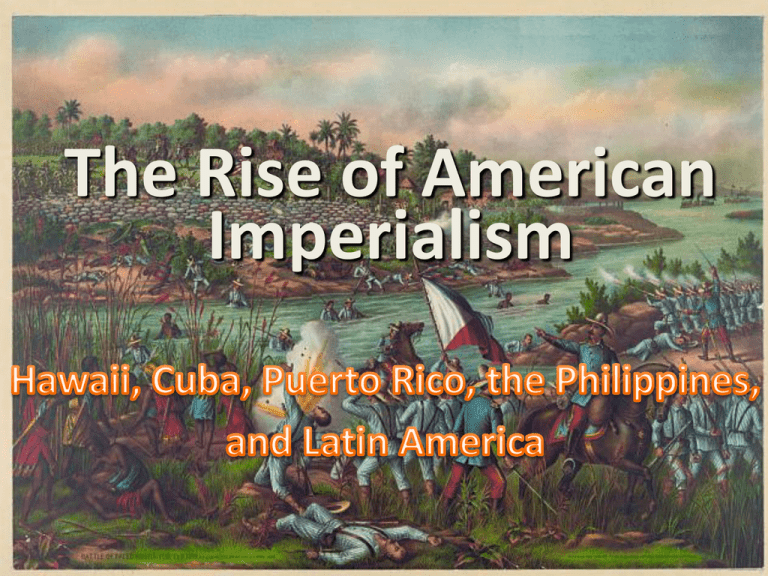
The Rise of American Imperialism ■Essential Question: –How did America’s role in the world change by 1900? ■ Warm-Up Question: –What is “foreign policy”? –Why would the U.S. want to annex each of the following territories during the late 1800s? *Alaska *Hawaii *Puerto Rico America’s Changing Role in the World ■From 1790 to 1900, the U.S. expanded its role in world affairs: Explain what each of the following primary sources reveal about America’s foreign policy at the time of the quote America’s Changing Role in the World ■ From 1790 to 1900, the U.S. expanded its role in world affairs: –In George Washington “The1796, Great rule of conduct for [the U.S.], a policy inpromoted regard to foreign Nations is in extending ofcommercial neutrality & to have with them our relations as little political connection as possible... warned against 'Tisalliances our true policy to steer clear of permanent with alliances, any portion of the foreign foreign with nations world” (especially Europe) —George Washington, Farewell Address (1796) America’s Changing Role in the World ■ From 1790 to 1900, the U.S. expanded its role in world affairs: –In the Monroe Doctrine “The1823, American continents…are henceforth not to be considered as subjects for future asserted neutrality colonization by any European powers. but proclaimed We should consider any attempt on their that the U.S. would part to extend their system to any portion protect the western of this hemisphere as dangerous to our hemisphere peacefrom and safety” —The Monroe Doctrine European influence (1823) America’s Changing Role in the World ■ From 1790 to 1900, the U.S. expanded its role in world affairs: “–In The 1845, American claim is by the right of our the U.S. manifest destiny to overspread and to possess used treaties & the whole of the continent which Providence wars to pursue its has given us for the development of the “Manifest great experiment of liberty and federated Destiny” self-government entrusted to us” & expand to the —John O’Sullivan, New York Morning News Pacific Ocean (1845) America’s Changing Role in the World ■ From 1790 to 1900, the U.S. expanded its role in world affairs: –By the 1890s, “American factories are making more the U.S. than the American people can use; gained soil newis producing more than American overseas they can consume. Fate has written colonies & us; the trade of the our policy for developed world mustaand shall be ours.” more active —Senator Albert Beveridge foreign policy (1898) Reasons for U.S. Imperialism ■In the late 1800s, the United States emerged as an imperialist nation: –Imperialism is the act of strong nations exerting their power over weaker nations, often by gaining new colonies –From 1867 to 1904, the U.S, annexed Alaska, Hawaii, Guam, Puerto Rico, the Philippines & built the Panama Canal American Imperialism European powers had acquired colonies & many Americans believed that the USA had to imperialize in order to keep-up From 1820 1890, In 1891, Queen U.S.toImperialism: HAWAII Americans moved Liliuokalani came to to Hawaii as power & tried to reduce missionaries & fruit the power of Americans plantation owners living in Hawaii Americans overthrew Queen Liliuokalani in 1893 & Hawaii was annexed by the USA in 1898 By theU.S. 1890s, European imperial powers Imperialism: CHINA carved China into spheres of influence, giving them exclusive trade rights in Chinese ports In 1899, the USA declared an Open Door Policy in China to allow free trade by any nation in any port In U.S. 1895,newspapers Cubans declared their independence sensationalized the events U.S. Imperialism: CUBA from Spain; To putasdown the journalism”) revolution, in Cuba (known “yellow Spain used brutal tactics (like starvation) In 1898, the U.S. sent the USS Maine to Cuba to protect American interests there; After the ship mysteriously exploded, Americans declared war on Spain The Spanish-American War was fought to liberate Cuba & the Philippines from Spanish control; The war lasted only 113 days Teddy Roosevelt & the Rough Riders As a result of the Spanish-American War, Cuba was liberated & the USA annexed the Philippines, Guam, Puerto Rico U.S. Imperialism: PUERTO RICO Puerto Rice is still a U.S. territory; Lots of poverty & unemployment When Philippines were annexed by U.S.the Imperialism: PHILIPPINES the USA & not granted independence after the Spanish-American War, the Filipino-American War began in 1898 The Filipino-American War lasted 3 years & cost more in money & American lives than the Spanish-American War TR added When the Theodore Roosevelt Roosevelt Corollary became to the U.S. Imperialism: DOMINICAN REPUBLIC Monroe Doctrine, giving United States president, he used “Bigthe Stick Diplomacy”: Developpowers” an activetoU.S. foreign policy with a “police protect Latin America strong from European navy to accomplish imperialism goals TR usedU.S. “BigImperialism: Stick Diplomacy” to build the PANAMA Panama Canal by encouraging a Panamanians to rebel from Colombia TheU.S. USAImperialism: tried to intervene in Mexican MEXICO affairs when Huerta overthrew Diaz & again when Carranza overthrew Huerta Mexico & the USA almost went to war when Mexican rebel Pancho Villa killed 33 Americans The Debate over American Imperialism ■ Not all Americans supported imperialism: – The AntiImperialist League formed in 1899 to fight U.S. annexation of the Philippines – Many argued that the U.S. had no right to force American culture upon others The U.S. Becomes a World Power ■ By the 20th century, the USA was a world power: – Built the world’s 3rd largest navy – Annexed Hawaii, the Philippines, Puerto Rico, many Pacific islands – Asserted itself in Latin America (Spanish-American War, Panama Canal, & Roosevelt Corollary – Influenced Asia (Open Door Policy)
